Fabrizio Ulivieri's Blog, page 103
August 16, 2019
Boring and shitty books - Kurt Vonnegut "The Sirens of Titan"
From today on I will start my personal crusade against absurd books that absolutely must be denounced as unuseful boredom, or at worst, absolute shit. Too many of these books, too many pseudo great writers who are worth nothing. There is no logic I believe inherent to the publishing market in publishing such shit, other than to keep the cultural and mental level low. At the minimum limits of brain activity.
First book.
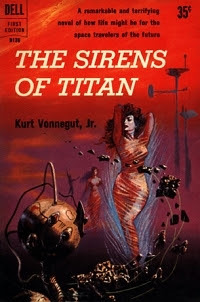
When you start reading this book after 5 pages you ask yourself "What the hell he writes? Is he serious? What does he say? What is this shit for?"
I think that as a comment it is quite complete. Such a book doesn't deserve many words.
Published on August 16, 2019 00:21
August 14, 2019
A Change, and underground fights (from "Memoires of a Martial Artist")
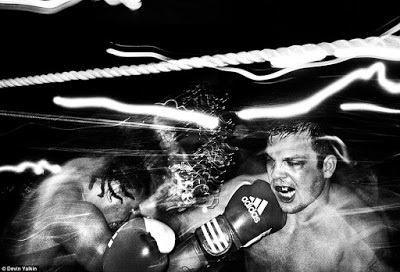
Two days after the lecture I went to the Tai Chi class of The
Master. His classes were then attracting a lot of girls. Lately, his classes had become a combination of spiritual and frivolous glamour. In the last months, he had been seen many times on the national Lithuanian TV in several talk shows. He had been interviewed by the most important Lithuanian magazines, which turned him into a fairly well-known personage in Lithuania.
The Master had changed. He was now very vulnerable to female beauty. He was defenceless against it.
He had lost his sense of calm trust in the fate of his mission, in the quiet submission to his stoic composure in the face of danger and in a certain disdain of worldly life.
He now appreciated the worldly life. He loved that kind of life, like never before.
I talked to The Master about his change.
His answer was quite curious.
- A man who has read a little, smells a little pedantic, a man who has read a lot smells even worse.
He realized my blank expression, for he added.
- An intellectual is like a machine. I now consider intellect less important than emotion. I now experiment with emotions. Ethical emotions. Intellectual emotions didn’t drive me where I wanted. I thought about my life…have you ever wondered why I do Thai Chi?
- No. Why?
- I used to combat before.
- You?
- Yes. Here in Vilnius, there is an underground fighting circuit, where anyone can fight. Illegal fights. Extreme fights. No Holds Barred Fighting.
- And you really did this?
- Yes.
- Why?
- I challenged myself. I wanted to overcome the fear I had.
- Fear? You? To fight?
- Yes, fear…that’s it. That’s it. It was what I needed to get over my panic. I needed adrenaline, the adrenaline that would pump in all my body, in every atom of my being. People come to see fighting for adrenaline. They bring you adrenaline. Music shakes the walls. People are intoxicated, yell, bay, get crazy, want to see blood. Jus wait for you stepping into the ring ready to draw blood from your opponent.
- Did you win?
- I won, I lost…but I learned to have a big heart. To combat you need a big heart. If you don’t have a big heart after 2-3 rounds…done. But if you fight with a big heart after the fight, when you live the ring. people surround you, touch you, yell out after you “You are great! You fight so crazy!”…too much, too much of everything. Too much violence. I had to change. I was just looking for a fight, anywhere ... so I started practising Thai Chi. I had to harness all that energy, focus it on one point. Dominate it. And maybe I become too sophisticated, too whimsical, freakish perhaps…
Photo via https://www.dailymail.co.uk
Published on August 14, 2019 07:37
July 31, 2019
The Young Idealist: Red Shirts
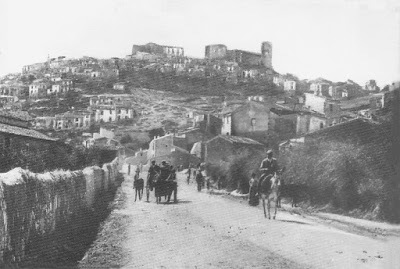
Palerm, March 4, 1861. Monday.
The sun shines on Palermo. It is 12:20pm when the old steamer Ercole releases its moorings. It is headed to Naples. On that steamship the last members of the expedition of the Thousand Red Shirts, the last ones left in Sicily, have embarked, the arrival is scheduled for the following morning. Three hours later also the Pompei left the port of Palermo, a steamship by far faster than the Ercole. On the same route, there are also two rickety tartanes with high-sounding names, the Angel Raffaele and La Madonna dell'Arco, and also an English war vessel is on the same route. It wouldn't be solitary navigation. But after turning a few degrees north-east and disappearing on the horizon the Ercole vanished, without any trace of ever existing.
Can the bad be more abundant than the good?
Red Shirts
Once I believed in The Providence, but not now, not any longer. I thought The Providence was a moral force that ruled the world. Now instead I believe in the power of my strength, the only power that keeps me alive.
Time writes moral not God. Men write moral not God. Flesh and bones write moral not God.
Blood writes moral.
Incerto tempore incertis locis[1]My life spanned two centuries. Therefore, I know the slight following of the many possibilities of life from a direction to another direction. I know the secret of swerving. There cannot be a free and fulfilled personal life until there is no free possibility to choose in compatibility with what the Moral has preordained for you.
It’s because of these wanderings of mine that I have been putting together my own particular idea of Patria.
For her, I knew the victory, for her I knew the defeat. For her, I knew the fight. For her, I knew the war. For her, I knew the honesty. For her, I knew the calumny.
I survived all them, though. And I loved, I loved all the women I met. But one above all others.
And I found life to be good, the day I knew how to choose, and I learned how to take control of my destiny.
We left Palermo; I see the skyline in the distance from the deck of the ship. We are headed to Naples. Tomorrow I will be in Naples. Magical and mysterious land, where the sun generates fruits in one day when elsewhere a month wouldn’t be enough.I was ordered to take my account books to Turin. They are waiting for me. Garibaldi has made many enemies in that city.
Dear Silvia,
I started this voyage to Turin, right now. I am on the deck of the steamship. I watch the see…and if I must be honest with you, I am afraid. I am afraid of this sea. I don’t know why but it just scares me. And this is the first time in my life, that I have fear of the sea. It is probably because I am seized by a state of anguish that it is not difficult to collect all my memories, now. Above all those of my childhood.
One thing has been spinning around my head for the last weeks. I am a child of despair. A child born to a desperate mother. I inherited it from her. A poor thing, my mother, ousted from her family in Venice, she died in a hospital and left me in the custody of filthy priests. Jesuits. I still have a vague memory of their slippery hands trying to caress my hair. And I shudder when I think about their bad breath lurking behind me.
I’ve never known my father. It was said that he died from heartbreak at being abandoned by my mother. For these many reasons, I say that I am a son of despair. I wrap myself in the darkness of my solitude, and in the desperation of my innocence.
I am depressed, Silvia.
I put all my passion for serving my ideals to forget my despair and overcome the depression. Foscolo's words come to mind "O my Lorenzo! I don't have the peace I hoped for from solitude”.
Dear Silvia, I hoped in solitude. I hoped in its power to heal the suffering that I carry within me. I am sure that you can understand me. You can understand what I mean. I believe you are born with an innate knowledge of human nature.
Do you remember how proud I felt, when we were children, and I enjoyed your favours for three days running?
We played a comedy, you me and the other boys. I don’t think there was any Court of Love ever ruled by one woman with such tyranny. We had to obey you at all costs, adore you as you demanded, and smile and laugh because you disliked everybody who was moody, and you were immediately prone to discarding him.
In those days I knew the disorders of precocious senses, that your spirit had awakened in my flesh.
Now vice is with us, it grows everywhere. Vice, corruption and betrayal. But these are not times in which the mortification of the moral can be a remedy. It's time for a new will and vigour.
The same sea, the same island had offered their welcome on May 11, 1860, to a thousand of young people in red shirts and grey trousers. At approximately 1:00 p.m, two steamers had come in sight, under Sardinian colours, and, steaming right up to the mole, began to discharge large bodies of armed foreigners. Boats of all kinds were soon around to assist in landing the men.
Five or six miles distant was a Neapolitan steamer of war, and, further off, a large sailing frigate. The first bore up for the port. The armed foreigners in red shirt were out of the vessel aground, but, for some reason, the Neapolitan steamer did not open fire till they were all formed and marching into the town. The frigate also came down, with a strong breeze, in time to deliver one ineffectual broadside.
Strangely enough when they had half of Garibaldi’s force trapped on a grounded vessel and the other half poorly armed sitting on the docks of Marsala harbour the two Neapolitan warships didn’t manage to capture, wound or kill a single invader.
In an uncertain, undetermined place and time
Published on July 31, 2019 02:20
July 13, 2019
Italian cognitive dissonance (apie vieną gurmanų klubą Vilniuje)
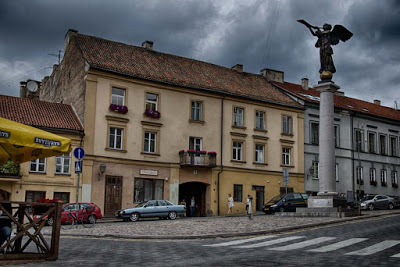
Užupis, a district of Vilnius - the so-called Republic of Artists. There is a restaurant right there, in the centre of the little central square – a magnificent place, very close to the bridge that you incontrovertibly must cross arriving from Onos Bažnyčia.
This restaurant is well known in the Italian community of Vilnius, famous for illustrious gourmands. Big bellies, bad breath, satisfied faces, bright and vivid eyes yearning for food. They have the most elaborated possible philosophies regarding their stand respect to traditional recipes, each of one consisting in a different universe: pasta alla puttanesca, carbonara, spaghetti alla amatriciana (one of the most vexed question: which is the original way to prepare the real pasta alla amatriciana? Eternally unsolved question, since are many heretical positions about it). Which wine with which course? How the right pesto alla genovese has to be done? They are ruthlessly fighting, opposing one dogma to another dogma. No jokes. Those are real problems, where no minimal oversight is allowed.
There is also a famous Facebook group, called Italian Gourmets in Vilnius, where scholarly talks and discussions about the themes as mentioned above, are regularly.
The tone of philosophical discussions is very high. One of the most recent debates in the posts of the group was “Does free will exists in elaborating recipes or is there a compatibilism?”
A detached observer (is it, anyway, possible a detached observer?) who randomly were sitting under the obelisk adjacent to the restaurant entrance should have the chance to watch them swarming back and forth from and to the restaurant would probably be under the impression to see a swarm of obnoxious insects aligned with the hope of food when waiting, with benign smiles on their visage after leaving.
Once I had a chat with one of the members. I realized how impeded he was to distinguish the world around him (Vilnius) and the world he left behind many years ago (Italy). They lived in one world but they still thought to live in the one they used to live before.
- You know this is my dividend of being excluded from Italian life.
Those words reminded me of other words: "How about if I sleep a little bit longer and forget all this nonsense?”
Inconsequential platitudes. Just inconsequential platitudes. That was the way those people were. Meaningless expression of platitudes.
I was a martial artist, I was not interested in food. Food for me was just a way of supplying my need for energy. I didn’t feel any particular pleasure when I ate.
But Italians in Vilnius, because of their persistence in their credo, reminded me of a philosophical distinction. The distinctions between hedgehog-thinkers and fox-thinkers.
Fox-thinkers without a unitary inner vision, hedgehog-thinkers with a unitary inner vision.
Italians were bearers of a single, universal message. They confined themselves to that exclusive activity. Eating.
They probably were foxes by nature but saw a better chance in being hedgehogs.
(To be continued...)
Published on July 13, 2019 06:24
July 12, 2019
Viaggio in Toscana, per presentare "Amore, šaltibarščiai e pomodori rossi"
Published on July 12, 2019 02:19
July 7, 2019
Mishima and Hagakure
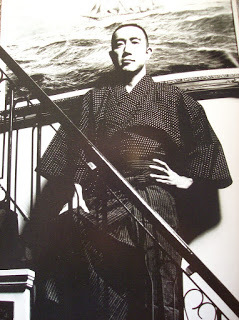
Mishima was obsessed for his entire life (or almost) by the re-gaining the values (ideologies) of a valuable life that has to be lived under the tension of art reinforced by the erotism of death.
The vision of his contemporary Japan was devastating to him. A land deserted by real values, whose DEATH undoubtedly was the highest (and probably unique) value (ideology) for Male-kind.
an age in which everything is based on the premise that it is best to live as long as possible. The average life span has become the longest in history, and a monotonous plan for humanity unfolds before us.
He cannot shun art as he cannot shun death since the life of an artist is subdued to death.
The occupation of the Samurai is death...death is the Samurai’s supreme motivation, and if a Samurai should fear or shun death, in that instant he would cease to be a Samurai.
Life doesn't allow to be caught off-guard. It doesn't allow laxity, because this would mean to resign his claim on the Perpetual Threat of Death, which offers to the Samurai/writer (Mishima) to defend his honour and his morale by constant anticipation. This will enable the Samurai/writer to be towards a-not-an-introspective-morality but towards a morality concentrating on external reflection.
This is the male samurai writer completely dismantled of laxity and of any feminisation, which is the antithesis of the samurai writer.
For these many reasons the samurai writer cannot be in peace with himself but he is devoted to a never-ceasing fight in name of superior value, that is always aimed beyond the current situation:
One who in wartime employs rough and manly words appropriate to an age of war and in time of peace words appropriate to peacetime is not a Samurai. It is essential for a Samurai to maintain logical consistency, and if one must show valour in one’s action during times of chaos, then one must demonstrate equal valour in words during a peaceful age.
Published on July 07, 2019 12:43
June 28, 2019
Trattoria Papa Re (Bologna): un'isola felice in mezzo al globalismo selvaggio
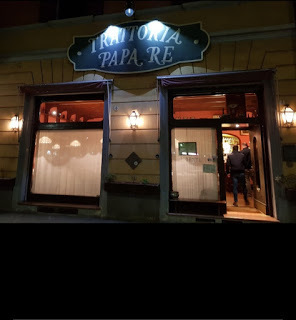
Bologna, piazza dell'Unità. Zona lunare. Un altro mondo. E' Italia mi chiedo? Per queste vacanze in Italia già me lo sono chiesto altre volte, a Siena a Empoli a Firenze, a Castiglion della Pescaia. Ma qui, nel regno di quelli che hanno sempre sostenuto l'immigrazione ad oltranza, la fantasia sbianca davanti alla realtà. Qui diciamo ci sono alcuni italiani fra il resto del mondo, che non sembra avere nessun rispetto per quella piazza, per quelle architetture italiche. per il clima torrido dell'estate italiana. Non ho sentito aggressività fisica ma culturale. Totale mancanza di adesione alla società in cui vivono, perché portatori di un virus globale che li rende resistenti, pari ad anticorpi.
Poi varchi la porta del limen, dell'ultimo avamposto di una cultura italiana vera, reale, l'ultimo limen di quella cultura che viene fagocitata dalla nuova. Varchi la porta della Trattoria Papa Re. Come dietro si te si chiude la porta della trattoria, dell'ultimo limen su quella piazza martoriata dalle razze aliogene si chiude anche il mondo alieno. E subito respiri la cultura della ristorazione alta, del piacere del servizio impeccabile. Dei piatti ben fatti. E' Italia, finalmente. E' un'isola felice di una cultura che resiste in un mondo che ha assunto altre linee di vita, senza relazioni con la sua storia. Di quella Italia che le facce multiculturali che rompono il panorama urbano italiano vogliono che dimentichi, presentandoti ripetutamente un tema di assurdi (e sudici) negozi alimentari asiatici, di kebabberie puzzolenti, di bar squallidi gestiti da personaggi dai colori mal definiti. Di sciattume e trasandatezza. Un mondo sordido, che non ci appartiene.
- La prima volta, che mangio bene in un ristorante, dopo dieci giorni di Italia, Di vacanze in Italia.
Finora ho mangiato da schifo. Questa sera mi sento riconciliato con il mio paese - dico al proprietario.
- E' cambiato tutto - mi risponde - una volta la gente veniva a cena in giacca. Ora in canottiera. Ma io non li faccio entrare.
In questa isola felice, Trattoria Papa Re, si serve ancora il vino come va servito. Si fa ancora un servizio di qualità, si accompagnano i piatti e li si spiegano. Si fa ancora una cultura che fuori è morta.
Fuori invece si beve birra. In cinquanta metri di piazza vi è di tutto, anche un incontro dei centri sociali,
Ma poi scopri un'isola felice, un'isola ancora italiana e ne rimani stupito. Rimani stupito che ancora esiste quella Italia, che vogliono estinta.
Published on June 28, 2019 12:13
Bologna, piazza dell'Unità. Zona lunare. Un a...
Bologna, piazza dell'Unità. Zona lunare. Un altro mondo. E' Italia mi chiedo? Già me lo sono chiesto altre volte, a Siena a Empoli a Firenze, a Castiglion della Pescaia. Ma qui, nel regno di quelli che hanno sempre sostenuto l'immigrazione ad oltranza, la fantasia sbianca davanti alla realtà. Qui diciamo ci sono alcuni italiani fra il resto del mondo, che non sembra avere nessun rispetto per quella piazza, per quelle architetture italiche. per il clima torrido dell'estate italiana. Non ho sentito aggressività fisica ma culturale.
Poi varchi la porta del limen, dell'ultimo avamposto di una cultura italiana vera, reale. Varchi la porta della Trattoria Papa Re. Come dietro si te sis chiude la porta, si chiude anche il mondo alieno. E subito respiri la culuta della ristorazione alta, del piacere del servizio impeccabile. Dei piatti ben fatti E' Italia. Quella Italia che le facce multiculturali che rompono lo skyline italiano vogliono che dimentichi, per gli assurdi (e sudici) negozi alimentari asiatici, kebabberie puzzolenti, bar squallidi gestiti da personaggi di colori mal definiti.
- La prima volta, che mangio bene in un ristorante, dopo dieci giorni di Italia, Di vacanze in Italia.
Finor ho mangiato da schifo. Questa sera mi sento riconciliato con il mio paese - dico al prprietario.
- E' cambiato tutto - mi isponde
Poi varchi la porta del limen, dell'ultimo avamposto di una cultura italiana vera, reale. Varchi la porta della Trattoria Papa Re. Come dietro si te sis chiude la porta, si chiude anche il mondo alieno. E subito respiri la culuta della ristorazione alta, del piacere del servizio impeccabile. Dei piatti ben fatti E' Italia. Quella Italia che le facce multiculturali che rompono lo skyline italiano vogliono che dimentichi, per gli assurdi (e sudici) negozi alimentari asiatici, kebabberie puzzolenti, bar squallidi gestiti da personaggi di colori mal definiti.
- La prima volta, che mangio bene in un ristorante, dopo dieci giorni di Italia, Di vacanze in Italia.
Finor ho mangiato da schifo. Questa sera mi sento riconciliato con il mio paese - dico al prprietario.
- E' cambiato tutto - mi isponde
Published on June 28, 2019 12:13
June 16, 2019
Ritorno alla Matrix - estratto da "Il giorno in cui l'Italia morì"

L’uomo non muore più per la strada, ma in casa sua, nella storia, nel pieno di un’attività consacrata a vincere la morte
(Boris Pasternak – Dottor Zivago)
Fabrizio capì che quella sarebbe stata l’ultima delle loro estati. Dopo quella, per loro su questa terra, non ce ne sarebbero state altre.
I segni si erano saldati in tanti insiemi sotto quel calore che coceva l’aria e chiedeva solo ai corpi sani di fargli resistenza. Erano segni che venivano dalla carne, dal mondo che era fuori infocato dal sole di luglio, dalle TV - ormai erano solo uno scorrere di immagini che non parlavano a nessuno. Dalla politica - una deriva che nemmeno Silvano capiva più (e sì che aveva lottato fino all’ultimo barlume di senno per riuscire a trovarvi un significato nuovo). Erano segni certi, quanto era certo che non potevano più essere ignorati. Un mondo, il loro mondo, che era alla fine. E le ultime derive di quel mondo erano loro due.
Quante volte aveva sentito suo padre dire “E’ morto Vitaliano”, “E’ morto il Bartalucci, l’hai saputo Sabatina”…ma erano frasi di quando stava bene e la morte era lontana. Apparteneva all’altro.
Gli venne in mente “La morte di Ivan Ilyich” di Tolstoy, uno dei libri più noiosi che avesse tentato di leggere. Si ricordò tuttavia di una frase che più o meno suonava così “"Il semplice fatto della morte di un conoscente vicino suscitò, come al solito, in tutti coloro che avevano sentito la notizia un sentimento compiacente - è lui che è morto, non io!”
E ora, non immaginava quanto ne avessero coscienza Silvano e Sabatina, ora, presto, si sarebbe detto “Hai visto? E’ morto Silvano”, “Hai saputo che Sabatina è morta l’altro giorno”.
Sarebbero morti in quella città affossata dal caldo, al centro della Toscana. Empoli. Una città senza qualità, retta da quei neocomunisti che Silvano, per tutta la vita, aveva tanto avuto inviso.
- Quando babbo è morto c’era una luce in un angolo della stanza, quello vicino alla porta. Come …una luce dorata…non come quella di una luce elettrica…ma una luce di candela…è rimasta per tutto il tempo che rantolava. Quando ha fatto l’ultimo grande respiro, ha indugiato ancora un po’. Si affievolita e poi è scomparsa.
Così gli aveva riferito Loris.
he avrà voluto dire quella luce? Mamma era morta in silenzio. Sotto l’effetto della morfina, che sedava il dolore dell’ulcera che si era aperta un buco vasto nello stomaco.
Fabrizio l’aspettava. Sarebbe dovuta ritornare. Aveva lasciato qualcosa insoluto in questa parte dell’universo. Attendeva certo quel giorno. I morti non possono lasciare insolute le attese.
Quelle due morti, una dietro l’altra, l’avevavano gettato nella sensazione che evoca una partenza improvvisa di ospiti che si erano a lungo trattenuti.
Rimangono gli odori, i suoni muti ma chiari delle loro conversazioni, della loro lingua, il mondo che loro rappresentavano. Rimane tutto in sospeso, in attesa che la vita riprenda come prima. Non li pensi come morti, ma come partiti, diretti alle loro case, ai loro lavori, alle loro occupazioni. Alla loro vita di tutti i giorni.
Ecco, Fabrizio non li pensava morti, li immaginava esattamente così. Non aveva bisogno di prendere il telefono e chiamarli. Non aveva mai smesso di comunicare con loro.
Avrebbe proseguito tante cose che loro gli avevano insegnato. Avrebbe fatto il brodo di carne come facevano loro, avrebbe fatto la pasta e fagioli come facevano loro, avrebbe cotto il coniglio come gli avevano insegnato loro, avrebbe spazzato la cucina come facevano loro ogni volta che avevano finito il pranzo e la cena. Avrebbe lavato ogni sera i piatti come loro facevano, avrebbe messo gli avanzi della cena in piccoli tegami per conservarli meglio in frigo come facevano sempre loro…si sarebbe alzato da letto aiutandosi con le mani nello stesso modo che faceva suo padre, e se ne sarebbe sorpreso a ritrovarsi nella stessa postura. Avrebbe avuto il carattere burbero e ombroso di sua madre, avrebbe avuto le loro stesse idee sull’aiutare gli altri, né più né meno avrebbe sempre più assomigliato a loro ogni giorno di più…
Suo padre non era morto di cancro, erta morto di consunzione, consunto, probabilmente, da quella stessa rabbia che lo aveva tenuto in vita.
Consunto come questa povera Italia, che oltre a tutte le ingerenze di tutti i servizi segreti, alla sottomissione della propria sovranità a tutte le forze estere possibili, era anche divorata da una sovrapposizione interna di poteri. Dal potere della magistratura che si era sostituito a quello politico, e da quello politico (almeno quella parte che del marxismo culturale ha fatto il proprio cavallo di battaglia) che si era per convenienza sottomesso a quello della magistratura.
Ci si era mossi per teoremi per condannare. Si erano applicati teoremi a fenomeni politici per ottenere effetti mediatici. Il fenomeno mediatico era ormai l’effetto trainante dei due poteri.
- La legge non è uguale per tutti, ma è più severa con chi non la pensa come te. Si tratta di accanirsi su una persona, o di utilizzare con questa metodi che non useresti con altri, solo perché ciò ti fa sperare in un ritorno d’immagine. (…) A questo punto mi si chiederà inevitabilmente: il ragionamento vale anche per Berlusconi? Non entro nel merito dei processi, che non conosco, non ho titolo per farlo, ma mi sento di affermare senza paura di essere smentito che se Berlusconi non fosse entrato in politica non avrebbe ricevuto tutte le attenzioni giudiziarie che ha ricevuto[1].
Il primo grande teorema fu quello definito ‘Teorema Calogero” della Procura della Repubblica di Padova, dal nome del giudice Pietro Calogero della Procura della Repubblica di Padova, che collegò le responsabilità di alcuni docenti universitari predicanti l'eversione (cattivi maestri) con le azioni terroristiche. E fu in quegli anni che ci si cominciò a rerndere conto della forza di fuoco della magistratura che poteva supplire uno stato in evidente difficoltà.
Ma fu ai tempi di Tangentopoli che che l’ombra dell’ideologia della questione morale inaugurata da Berlinguer nel tentativo di trovare un’alternativa allo scacco subito con la morte di Moro, convinse una parte della magisttratura, quella più forte, di avere una funzione salvifica, di dover non solo combattere la corruzione ma anche di redimere l’Italia.
Berlusconi con la sua discesa in campo riaprì un clima da guerra fredda, e la sinistra che visse quella nuova guerra fredda trasformando la questione morale in antiberlusconismo e identificando tutto il male con Berlusconi rafforzò de facto il potere della magistratura, affidandosi ad essa per combattere l’ispiratore stesso della propria politica di quegli anni: Silvio Berlusconi.
Come sempre ci si concentrò da una parte sul proprio orticello da coltivare e dall’altra ci si fece proni a quei poteri che muovevano l’Europa (che poi erano gli stessi che ormai muovevano il globo tutto).
Ma Silvano e Sabatina erano scivolati via, passati silenziosamente attraverso queste nuova linee di realtà, come facendo uno specie di trans-surfing, che la vecchiaia gli aveva imposto.
Vissero attaccati a quel nuovo mezzo di trasporto, ma per loro fortuna (o sfortuna?) questa nuova realtà non li catturò più, e ne furono finalmente liberi.
Si liberarono da quella morte odiosa, il 1943, che aveva impresso la spinta deterministica della loro vita di silenziosa remissione alla quotidianità.
Ma loro non morirono con il fucile in braccio urlando il proprio credo come forse morì Rocco e i partigiani che combattevano Rocco – ma in nome di che? visto gli innumerevoli tradimenti perpetrati alla memoria del loro inutili sacrifici.
Morirono, mangiati dalla vecchiaia, in un letto di ospedale, incapaci di intendere e volere, incapaci di esprime anche la più frequente delle paure dell’uomo davanti alla morte: quella di morire soli, abbandonati dai propri amati.
Morirono inconsci di tutto, anche del loro corpo ridotto a una carcassa priva di senso. Morirono, e basta.
Ma Fabrizio sorrise, lungo quel viale alberato su cui inondava luce quel cielo nuovo che lo accoglieva. Sorrise dentro alla voce del padre che gli parlava, dentro. Sorrise dentro a quella nuova quantità di coscienza che rinasceva, sotto altra forma, che adesso percorreva altri mondi lontani, eppure vicini.
[1] Piero Tony, magistrato (ex magistratura democratica)
Published on June 16, 2019 04:22
June 9, 2019
Love, šaltibarščiai and red tomatoes - text analysis and the nature of love
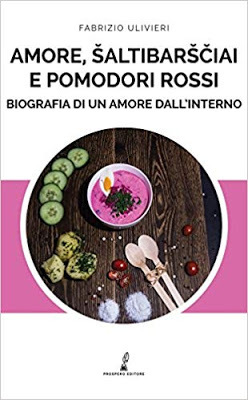
This book was written between 2016 and 2017, in six months. Published in 2018. One of the advantages (or disadvantages) of talking about a book that has been given to the press almost one year ago is that you forget (at least me) all of what you wrote. In this lapse of time you took a break from the tension that created you to write the book, because of reading the text ad infinitum to find errors, mistakes and things that did not work, which almost led to hate what you wrote; because of proofreading, which collapsed you into the stress you seemed to have forgotten - and which perhaps, in my case at least, causes you more stress than when you wrote it. Finally, this long pause brings you out of that excessive accumulation of energy and concentration that prevents you from any detached reading. But reading again this text one year later leads you to evaluate the text according to a range of possibilities that you didn't have before, brings you in a universe that you didn't belong to before, compared to the moment you wrote the book, in this universe you can now judge the book with another look. Very far from those (now) far initial universes you belonged to. You see now a new version of the facts you told previously in the book.
At this time I find it like a Proustian text, which I didn’t notice when I wrote it, although in those days I read some parts of Proust's Research. To be honest I discovered a nice text, in line with my thoughts and the way of writing that belongs to me as I understand it - writing to communicate, to make people think, to give a message, to make people aware of certain issues, without getting them bored, relying on contents that you find most surprising and supported by the rhythm. It is obviously the author’s opinion, who believes, though, in his reliability regarding his perceptions because - given the number of books (and shit) who reads in one year – he can dare to say that he has developed a critical sense for his own works.
"Love, šaltibarščiai and red tomatoes" has a double possibility of reading. It is a novel because it tells a love story. It is an essay because it investigates, in depth, the nature of love.
To be more precise, it speaks of the nature of love elicited by an analysis capable of robustly grasping and identifying thoughts, intentions, h/ History of the protagonist, Austėja Stašytė, in an entangled relationship with the male protagonist.
NATURE OF LOVE.
Love has value because we recognize it as a value, and only when/and because we recognize it as a value. Every act of love has the same quality, of Love, that corresponds to what Love is in itself - as each unit of measure has the quality corresponding to that which must measure. So the meter has the quality of length because it measures the length, but it is not only the measure of the length, it is also the length of the measurement because it is one meter long.
Thus, love corresponds to the act, but it is not solely that act, as each act is measured by the love that creates the act. And the acts take place within the structure of the lines of reality that have placed us in a different location completely distinct from the one previously assigned (History),
For this reason the book, which is a biography [read page 125 to understand the very intention of this biography] eventually becomes also a kind of contrastive grammar on the two mentalities that come to be located in the same space, following lines of different realities - History [read page 56 - final part - to understand the the very meaning of this correlation]. In their localization the two mentalities are exposed, they reveal themselves in their intimacy (let us not forget that love is the place par excellence where intimacy is shown). But intimacy is always and, in any case, caught through the lens of historical perspective that elicits confirmation about the way of loving (i.e. of love).
It is a book specially written for those who generously search for love, for those who love, for those with a vital interest in love. It is a book that if you allow yourself to be taken by the spirals of the analysis of the main characters thoughts, by the vivisection of their feelings, is almost similar to a thriller, and the rhythm catches you and transports you page after page.
The book is for sale on IBS
Published on June 09, 2019 07:49



